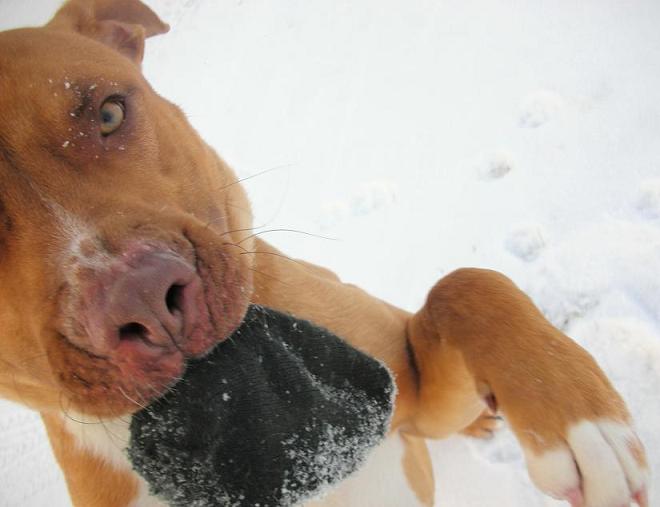
People have been asking me about what’s involved with volunteering at an animal shelter and how to get started. There are so many ways to volunteer with animals. Walking shelter dogs, fostering a homeless dog or fostering a future service dog are just a few examples.
And the reasons to volunteer are obvious. You will improve the lives of dogs and cats just by spending time with them. You will save lives, and you will feel uplifted knowing you are making a difference.
If you are interested in volunteering, call or email a dog shelter or rescue in your area and ask how you can get involved. Call more than one place, because different programs have different needs.
What to know before volunteering at a dog shelter:

1. Volunteering involves more than playing with puppies.
OK, you might be lucky enough to socialize and supervise puppies and kittens, but most animal shelters or rescues need volunteers to walk or run the big dogs, scoop the cat boxes, pick up poop, mop floors and answer phones. Scooping frozen poop or spraying down a kennel full of diarrhea is probably not your idea of fun, but someone has to do it. Woo hoo!
2. Walking shelter dogs is hard work.
Get used to 60-pound retriever, pitbull and shepherd mixes pulling you because it’s going to happen. Walking these dogs isn’t exactly leisurely. The dogs have pent-up energy, little training and have a hard time focusing. Many are dog aggressive and want to chase everything that moves.
If you’re not comfortable walking these types of dogs, then request to walk the small dogs or ask if you can play with the dogs in a fenced area. Sometimes I bring my own leather leash and prong collar when I run with rescue dogs just to make sure I am in control. But this only helps if the collar fits properly.
3. If you get hurt, the shelter or rescue is not reliable.
Find out how the shelter handles dog bites and other injuries before an accident occurs. You will probably have to sign a form saying the shelter is not responsible if you are hurt or if one of the animals you are working with bites someone else. This could affect whether you want to volunteer or not so ask for this information.
4. You will see or hear of animals in pain.
Dogs and cats often end up in rescues after living in bad situations. Sometimes people unintentionally hurt their animals by keeping them confined to one room or a garage 24 hours a day. Other dogs are homeless, sick or injured for unknown reasons and some have been beaten or abused in other ways. If you volunteer at a dog shelter, you will be exposed to many sad situations involving dogs.
5. You will be aware of animals dying.
Some shelters euthanize animals. Others ship the dogs somewhere else to be killed. And those that don’t kill any animals must turn dogs and cats away due to a lack of space. You might even help decide which dogs live and which dogs die.
6. You could get scratched or bitten.
I’ve been scratched and bitten by dogs too many times to count. If you volunteer at a dog shelter, you will be dealing with stressed, scared and excited animals that have not had enough exercise, socialization or training. Dogs will jump on you, run into you and pull you. Any dog at any time can bite, but dogs in the shelter system are much more unpredictable than the average pet.
Cats especially will be freaked out. There’s a good chance you will be socializing Ferrel cats (with claws of course!) that have had little or no interaction with humans. And cat bites are serious.
7. Look beyond humane societies for volunteer opportunities.
The humane society in my town has so many volunteers that it can turn help away. I stopped in one time to see if any of the dogs needed a run and the staff showed little interest because they had enough help.
I took home an application but never bothered filling it out because of all the requirements such as references, job history and pages of extensive questions. It wasn’t worth my time so I chose to volunteer at smaller, independent animal rescues. In my area of about 200,000 people there are at least five or six animal rescue groups besides the humane society that depend on volunteers.
8. There will be an application form and training.
Most dog shelters will require all volunteers to fill out an application form of some sort. Some will check references and have more extensive application processes than others. Usually the age requirement is 16. Some will have drawn-out training programs while others will only require you to meet with the volunteer coordinator to make sure you can actually control a dog.
9. Use your specific skills.
Just because a shelter or rescue organization doesn’t have a “job description” for you doesn’t mean they don’t need you. If you are a dog trainer, I guarantee you there are rescue dogs that desperately need training. If you are a runner like me, almost all the dogs could use a long run.
If you know how to make a web site, many shelter sites could use an update if they even have a web site at all. If you’re good with people and persuasive, then why not get out there and convince some people to adopt a homeless pet? If you love kids, you could probably lead a school tour through the shelter. If you take good pictures, then make some fliers of homeless dogs and post them around town.
10. Volunteering with animals requires working with people, too.
As introverted as I am, I would much rather hang out with dogs all day than people. But there are endless volunteering opportunities that involves strong communication skills such as matching dogs with potential owners, training new volunteers, speaking to the public about spaying and neutering or informing people about American pitbull terriers. Writers, speakers, event coordinators and fundraisers are always needed.
11. Required hours vary from shelter to shelter.
The rescue I run dogs for is flexible because the dogs are boarded at a local kennel. I can show up during their open hours and run dogs whenever I want. Other rescues are not this flexible. For example, our humane society puts its volunteers on a schedule and requires a certain amount of hours per week.
12. You will want to adopt all the homeless dogs and cats.
Many animal lovers avoid volunteering at animal shelters for this reason. I’m still struggling with just saying no and realizing I can’t save all the animals. Need I say more?
What are your experiences with volunteering at dog shelters? If you’re interested in volunteering, what questions do you have?
Above is Jesse, an American pitbull terrier with 4 Luv of Dog Rescue in Fargo. He is a beautiful, playful dog available for adoption. Edit: Jesse has been adopted!

Angel
Sunday 14th of June 2009
I want to volunteer for school causes and maybe even donate some money I care for animal and want them to be rescued and let them get some exercise. I love animals and want to help!! Thank You for listening to me hopefully I will see you.
Lindsay Stordahl
Monday 16th of March 2009
Hi Elle. I know what you mean about how some people are only good with dogs and not with people! Sorry you didn't have the best experience. Maybe you can work at a time when that volunteer won't be there. Or maybe there is another shelter that needs volunteers. Either way, I'm sure the dogs and the shelter coordinators appreciated your work!
Elle
Friday 13th of March 2009
Today I walked dogs at the animal shelter. Everything you wrote is so true. One thing I've noticed is that the people who volunteer for this are not good with people; they are only good with dogs. I said a friendly hello to an arriving volunteer, and she told me I was too dressed up to walk dogs. I had on the same thing she had on--capris and a knit shirt. What she didn't like was I had on a red khaki jacket that coordinated with the knit shirt. She thought I was wearing it for fashion rather than for warmth. That made me want to get in my car and head out of there.
Lindsay Stordahl
Sunday 25th of January 2009
Angie, I'm sure you can get involved somehow. You just have to ask. When I was in middle school I volunteered to walk dogs with a school group at a humane society and we had an adult come along.
angie
Sunday 25th of January 2009
Lori, is your last name Turnur?